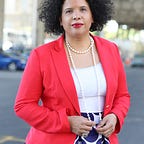Watch Me Work: I Am Not Special
After so many years as a woman of color in media, I have the privilege to mentor young professionals, especially younger women starting out, those pivoting in or out of the industry, or a few who are trying to ‘get free.’
After the usual questions about how my career and how I took the leap to start my own company, we get to a moment in the conversation that is becoming easier for me to recognize. It is the moment when, always without being prompted, I tell the young professional, “Don’t worry. If I can do it, you can do it.”
It is such a simple phrase to utter, but the implications are profound for talented and hardworking women of color who have followed a traditional path to a corporate version of success. I know, because I wore out many pairs of nice shoes walking that very same path.
As I talk to these women, I have come to realize that what some of them want is a blessing, a simple affirmation that they are equipped and ready to take, perhaps, the biggest chance in their career. But because I have just begun to get to know them or this might be the first time we talk after they reached out to me, I cannot speak to their strengths and potential, but I can reassure them of one vital truth:
I am not special.
It seems like a counterintuitive thing to say in the age of the personal brand. It certainly seems odd to say it about yourself to someone who sought you out for advice. But it is actually the most powerful thing I can impart on an aspiring journalist or writer or solopreneur: I do not possess any ability that is beyond her; I have not been granted special knowledge that she does not have access to; I do not have a secret code that renders the Hereculian more manageable.
I am not special.
But I work very hard.
When I worked in establishment media, I put in a lot more hours than required, I taught myself lots of skills, like how to copy edit, how to use design software, I volunteered for editorial innovations being tried out, and pushed myself at every opportunity. But that does not make me special. Lots of people do that.
So the second piece of advice I offer is also based on experience:
Take big risks.
And that’s where the conversation usually takes a significant turn. I ask blunt questions: What are you willing to give up? What are you ready to learn? How long are you willing to defer gratification? How much sleep do you really need? Who’s in your support circle? How are you going to finance this? What else do you need to learn to get started?
These are the foundational questions I asked myself a year ago when I decided to become a solopreneur. And they are still the questions that guide me as I make decisions about the work my company takes on and the direction I’m leading my team. Personally, it is very gratifying.
But it there’s a veil that distorts reality and creates a false sense of exceptionalism around women of color who are successful, who take big risks, who make big sacrifices, and who work diligently at their craft.
And that’s dangerous.
It’s dangerous because it sends the erroneous message that women of color who achieve great feats are so rare as to be unicorns endowed literally with magic. But that is seldom the case. Women of color who achieve success on their own terms — which is after all what most of the younger women I speak want — do so because they work really hard and take big risks.
With all my admiration and love for her, I can say that Ava DuVernay is not special. She worked behind the scenes for years, sacrificed her financial safety to fund her first film, and shot on weekends while managing a full-time Hollywood publicity career. Ava was most recently at the Cannes Film Festival where she was on the jury and lead a historic protest for women’s inclusion. All of it due to her talent and the fact that Ava works very hard.
Tanzina vega is a friend who inspires me daily, but I can say that Tanzina is also not special. She spent two decades doing the type of work covering people of color that set the bar for the New York Times and CNN. She did it one byline at a time, and is today leading The Takeaway, one of the best current affairs shows on national radio. All of it due to her talent and the fact that Tanzina works very hard.
Ava’s and Tanzina’s abound and we are so lucky to witness their brilliance. But they are not unicorns endowed with special powers. I celebrate and admire them because they set an example for me, and for so many other women of color, of what diligence and perseverance can make possible when sharpened by talent.
Like them, I am not special, but I work very hard.
Juleyka Lantigua-Williams has been a multimedia professional for almost two decades. A former staff writer at The Atlantic, she was also the lead editor/producer of NPR’s Code Switch. She has now turned her focus to creating high-quality audio and film productions using the tenets of journalism she honed over her extensive career. In 2017, after falling madly in love with podcasting, she founded Lantigua Williams & Co., a podcast and film studio based in the Washington DC area. Juleyka continues to make inclusion a central theme in her work, which now focuses on creative-centered collaboration in digital formats. She’s still trying to fully understand her own experiences as a hyphenated American.
Follow her @JuleykaLantigua
